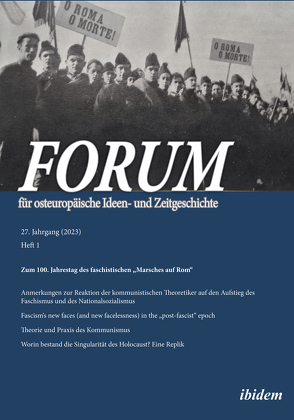
[Over] the last decade there has emerged a growing explicit (theoretically formulated) or tacit (pragmatic) acceptance by Anglophone academics working in the field that fascism’s ineliminable core is made up of the vision of a regenerated political culture and national community brought about in a post-liberal age. Inevitably, such a consensus can never be total and there are academics working in fascist studies who continue to apply a different ideal type of fascism, some of whom express deep scepticism about the very existence of an area of convergence on the centrality to fascism of an ultra-nationalist myth of rebirth. The most cited version of the consensus applied by academics who are sympathetic to it is the highly synthetic formula that I used to encapsulate my own ideal type: ‘Fascism is a political ideology whose mythic core in its various permutations is a palingenetic form of populist ultra-nationalism …
The totalitarian movements represented by the PNF and the NSDAP and the totalitarian regimes that they underpinned became the role model for all revolutionary nationalists in the inter-war period and synonymous with totalitarian, mass-based revolutionary nationalism itself. This became known as ‘fascism’ after the first such movement to achieve power, namely Mussolini’s fascismo. However, it was only in Italy and Germany that the structural crisis of liberal society was profound enough to generate a genuinely charismatic form of populist politics, one which was not confined to the hard core of movement activists, but involved the particular type of consensus generated by a ‘palingenetic political community’, thereby creating the basis for a fascist regime.
(Aus dem Beitrag von Roger Griffin)
Aktualisiert: 2023-07-03
> findR *
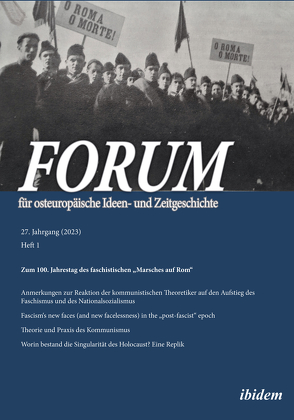
[Over] the last decade there has emerged a growing explicit (theoretically formulated) or tacit (pragmatic) acceptance by Anglophone academics working in the field that fascism’s ineliminable core is made up of the vision of a regenerated political culture and national community brought about in a post-liberal age. Inevitably, such a consensus can never be total and there are academics working in fascist studies who continue to apply a different ideal type of fascism, some of whom express deep scepticism about the very existence of an area of convergence on the centrality to fascism of an ultra-nationalist myth of rebirth. The most cited version of the consensus applied by academics who are sympathetic to it is the highly synthetic formula that I used to encapsulate my own ideal type: ‘Fascism is a political ideology whose mythic core in its various permutations is a palingenetic form of populist ultra-nationalism …
The totalitarian movements represented by the PNF and the NSDAP and the totalitarian regimes that they underpinned became the role model for all revolutionary nationalists in the inter-war period and synonymous with totalitarian, mass-based revolutionary nationalism itself. This became known as ‘fascism’ after the first such movement to achieve power, namely Mussolini’s fascismo. However, it was only in Italy and Germany that the structural crisis of liberal society was profound enough to generate a genuinely charismatic form of populist politics, one which was not confined to the hard core of movement activists, but involved the particular type of consensus generated by a ‘palingenetic political community’, thereby creating the basis for a fascist regime.
(Aus dem Beitrag von Roger Griffin)
Aktualisiert: 2023-07-03
> findR *
Der Band zielt auf einen Vergleich historischer Regionen in der Langzeitperspektive. Jürgen Bergmann und Klaus Megerle untersuchen die regionalen Unterschiede ländlichen Protests im Vorfeld des Aufstiegs der NSDAP, Jürgen Brockstedt verfolgt den durch die Industrialisierung initiierten Wandel im Agrarsektor in den Teilregionen des Herzogtums Oldenburg zwischen 1870 und 1914, Rainer Fremdling befaßt sich mit den regionalen Kohlemärkten in Norddeutschland zwischen 1850 und 1913, Hartmut Kaelble und Rüdiger Hohls untersuchen den Langzeitwandel in den regionalen Disparitäten der Erwerbsstruktur zwischen 1895 und 1970, Hubert Kiesewetter behandelt den Zusammenhang zwischen regionalen Lohndisparitäten und der Wanderungsbewegung im Kaiserreich.
Aktualisiert: 2023-07-02
> findR *
Der Band zielt auf einen Vergleich historischer Regionen in der Langzeitperspektive. Jürgen Bergmann und Klaus Megerle untersuchen die regionalen Unterschiede ländlichen Protests im Vorfeld des Aufstiegs der NSDAP, Jürgen Brockstedt verfolgt den durch die Industrialisierung initiierten Wandel im Agrarsektor in den Teilregionen des Herzogtums Oldenburg zwischen 1870 und 1914, Rainer Fremdling befaßt sich mit den regionalen Kohlemärkten in Norddeutschland zwischen 1850 und 1913, Hartmut Kaelble und Rüdiger Hohls untersuchen den Langzeitwandel in den regionalen Disparitäten der Erwerbsstruktur zwischen 1895 und 1970, Hubert Kiesewetter behandelt den Zusammenhang zwischen regionalen Lohndisparitäten und der Wanderungsbewegung im Kaiserreich.
Aktualisiert: 2023-07-02
> findR *
Der Band zielt auf einen Vergleich historischer Regionen in der Langzeitperspektive. Jürgen Bergmann und Klaus Megerle untersuchen die regionalen Unterschiede ländlichen Protests im Vorfeld des Aufstiegs der NSDAP, Jürgen Brockstedt verfolgt den durch die Industrialisierung initiierten Wandel im Agrarsektor in den Teilregionen des Herzogtums Oldenburg zwischen 1870 und 1914, Rainer Fremdling befaßt sich mit den regionalen Kohlemärkten in Norddeutschland zwischen 1850 und 1913, Hartmut Kaelble und Rüdiger Hohls untersuchen den Langzeitwandel in den regionalen Disparitäten der Erwerbsstruktur zwischen 1895 und 1970, Hubert Kiesewetter behandelt den Zusammenhang zwischen regionalen Lohndisparitäten und der Wanderungsbewegung im Kaiserreich.
Aktualisiert: 2023-07-02
> findR *
Meist werden die Ursachen für den wirtschaftlichen Rückstand im Nordosten Deutschlands im falschen Management der Wiedervereinigung oder in der DDR-Planwirtschaft gesucht. Die Wurzeln scheinen jedoch tiefer zurückzureichen. Während sich Sachsen, Thüringen, Oberschlesien, Rheinland und Westfalen im 19. Jahrhundert industrialisierten, blieb ein solcher Anstoß – mit Ausnahme der Hafenstadt Stettin – in Pommern aus. Industrialisierung und Modernisierungsind sowohl durch Eingriffe des Staates als auch durch Initiativen aus der Gesellschaft heraus bewirkt worden. Doch nicht nur funktionierende Selbstverwaltung und Infrastrukturausbau sind wichtige Voraussetzungen für wirtschaftliches Wachstum, auch Investitionen in das Bildungswesen und eine dem Wandel gegenüber aufgeschlossene Mentalität gehören dazu. Wie es um diese Faktoren während des 19. Jahrhunderts in Pommern stand, ist Thema des vorliegenden Bandes.
Aktualisiert: 2023-06-28
> findR *
Meist werden die Ursachen für den wirtschaftlichen Rückstand im Nordosten Deutschlands im falschen Management der Wiedervereinigung oder in der DDR-Planwirtschaft gesucht. Die Wurzeln scheinen jedoch tiefer zurückzureichen. Während sich Sachsen, Thüringen, Oberschlesien, Rheinland und Westfalen im 19. Jahrhundert industrialisierten, blieb ein solcher Anstoß – mit Ausnahme der Hafenstadt Stettin – in Pommern aus. Industrialisierung und Modernisierungsind sowohl durch Eingriffe des Staates als auch durch Initiativen aus der Gesellschaft heraus bewirkt worden. Doch nicht nur funktionierende Selbstverwaltung und Infrastrukturausbau sind wichtige Voraussetzungen für wirtschaftliches Wachstum, auch Investitionen in das Bildungswesen und eine dem Wandel gegenüber aufgeschlossene Mentalität gehören dazu. Wie es um diese Faktoren während des 19. Jahrhunderts in Pommern stand, ist Thema des vorliegenden Bandes.
Aktualisiert: 2023-06-28
> findR *
Meist werden die Ursachen für den wirtschaftlichen Rückstand im Nordosten Deutschlands im falschen Management der Wiedervereinigung oder in der DDR-Planwirtschaft gesucht. Die Wurzeln scheinen jedoch tiefer zurückzureichen. Während sich Sachsen, Thüringen, Oberschlesien, Rheinland und Westfalen im 19. Jahrhundert industrialisierten, blieb ein solcher Anstoß – mit Ausnahme der Hafenstadt Stettin – in Pommern aus. Industrialisierung und Modernisierungsind sowohl durch Eingriffe des Staates als auch durch Initiativen aus der Gesellschaft heraus bewirkt worden. Doch nicht nur funktionierende Selbstverwaltung und Infrastrukturausbau sind wichtige Voraussetzungen für wirtschaftliches Wachstum, auch Investitionen in das Bildungswesen und eine dem Wandel gegenüber aufgeschlossene Mentalität gehören dazu. Wie es um diese Faktoren während des 19. Jahrhunderts in Pommern stand, ist Thema des vorliegenden Bandes.
Aktualisiert: 2023-06-28
> findR *
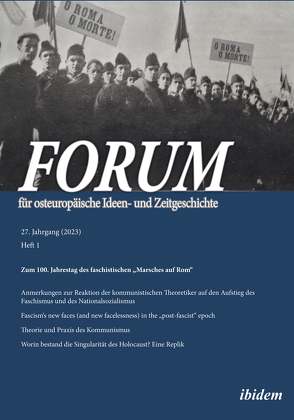
[Over] the last decade there has emerged a growing explicit (theoretically formulated) or tacit (pragmatic) acceptance by Anglophone academics working in the field that fascism’s ineliminable core is made up of the vision of a regenerated political culture and national community brought about in a post-liberal age. Inevitably, such a consensus can never be total and there are academics working in fascist studies who continue to apply a different ideal type of fascism, some of whom express deep scepticism about the very existence of an area of convergence on the centrality to fascism of an ultra-nationalist myth of rebirth. The most cited version of the consensus applied by academics who are sympathetic to it is the highly synthetic formula that I used to encapsulate my own ideal type: ‘Fascism is a political ideology whose mythic core in its various permutations is a palingenetic form of populist ultra-nationalism …
The totalitarian movements represented by the PNF and the NSDAP and the totalitarian regimes that they underpinned became the role model for all revolutionary nationalists in the inter-war period and synonymous with totalitarian, mass-based revolutionary nationalism itself. This became known as ‘fascism’ after the first such movement to achieve power, namely Mussolini’s fascismo. However, it was only in Italy and Germany that the structural crisis of liberal society was profound enough to generate a genuinely charismatic form of populist politics, one which was not confined to the hard core of movement activists, but involved the particular type of consensus generated by a ‘palingenetic political community’, thereby creating the basis for a fascist regime.
(Aus dem Beitrag von Roger Griffin)
Aktualisiert: 2023-06-29
> findR *
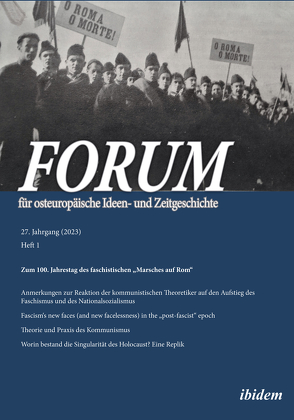
[Over] the last decade there has emerged a growing explicit (theoretically formulated) or tacit (pragmatic) acceptance by Anglophone academics working in the field that fascism’s ineliminable core is made up of the vision of a regenerated political culture and national community brought about in a post-liberal age. Inevitably, such a consensus can never be total and there are academics working in fascist studies who continue to apply a different ideal type of fascism, some of whom express deep scepticism about the very existence of an area of convergence on the centrality to fascism of an ultra-nationalist myth of rebirth. The most cited version of the consensus applied by academics who are sympathetic to it is the highly synthetic formula that I used to encapsulate my own ideal type: ‘Fascism is a political ideology whose mythic core in its various permutations is a palingenetic form of populist ultra-nationalism …
The totalitarian movements represented by the PNF and the NSDAP and the totalitarian regimes that they underpinned became the role model for all revolutionary nationalists in the inter-war period and synonymous with totalitarian, mass-based revolutionary nationalism itself. This became known as ‘fascism’ after the first such movement to achieve power, namely Mussolini’s fascismo. However, it was only in Italy and Germany that the structural crisis of liberal society was profound enough to generate a genuinely charismatic form of populist politics, one which was not confined to the hard core of movement activists, but involved the particular type of consensus generated by a ‘palingenetic political community’, thereby creating the basis for a fascist regime.
(Aus dem Beitrag von Roger Griffin)
Aktualisiert: 2023-06-29
> findR *
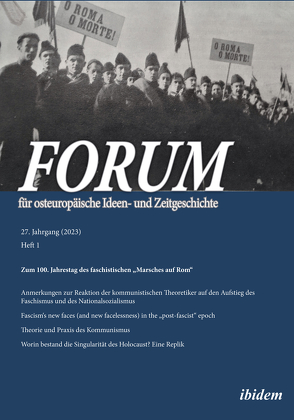
[Over] the last decade there has emerged a growing explicit (theoretically formulated) or tacit (pragmatic) acceptance by Anglophone academics working in the field that fascism’s ineliminable core is made up of the vision of a regenerated political culture and national community brought about in a post-liberal age. Inevitably, such a consensus can never be total and there are academics working in fascist studies who continue to apply a different ideal type of fascism, some of whom express deep scepticism about the very existence of an area of convergence on the centrality to fascism of an ultra-nationalist myth of rebirth. The most cited version of the consensus applied by academics who are sympathetic to it is the highly synthetic formula that I used to encapsulate my own ideal type: ‘Fascism is a political ideology whose mythic core in its various permutations is a palingenetic form of populist ultra-nationalism …
The totalitarian movements represented by the PNF and the NSDAP and the totalitarian regimes that they underpinned became the role model for all revolutionary nationalists in the inter-war period and synonymous with totalitarian, mass-based revolutionary nationalism itself. This became known as ‘fascism’ after the first such movement to achieve power, namely Mussolini’s fascismo. However, it was only in Italy and Germany that the structural crisis of liberal society was profound enough to generate a genuinely charismatic form of populist politics, one which was not confined to the hard core of movement activists, but involved the particular type of consensus generated by a ‘palingenetic political community’, thereby creating the basis for a fascist regime.
(Aus dem Beitrag von Roger Griffin)
Aktualisiert: 2023-06-21
> findR *
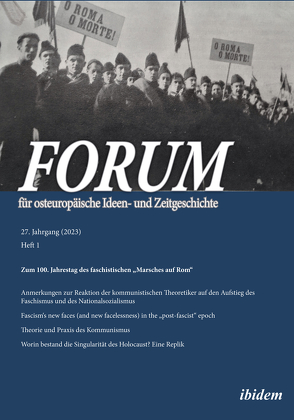
[Over] the last decade there has emerged a growing explicit (theoretically formulated) or tacit (pragmatic) acceptance by Anglophone academics working in the field that fascism’s ineliminable core is made up of the vision of a regenerated political culture and national community brought about in a post-liberal age. Inevitably, such a consensus can never be total and there are academics working in fascist studies who continue to apply a different ideal type of fascism, some of whom express deep scepticism about the very existence of an area of convergence on the centrality to fascism of an ultra-nationalist myth of rebirth. The most cited version of the consensus applied by academics who are sympathetic to it is the highly synthetic formula that I used to encapsulate my own ideal type: ‘Fascism is a political ideology whose mythic core in its various permutations is a palingenetic form of populist ultra-nationalism …
The totalitarian movements represented by the PNF and the NSDAP and the totalitarian regimes that they underpinned became the role model for all revolutionary nationalists in the inter-war period and synonymous with totalitarian, mass-based revolutionary nationalism itself. This became known as ‘fascism’ after the first such movement to achieve power, namely Mussolini’s fascismo. However, it was only in Italy and Germany that the structural crisis of liberal society was profound enough to generate a genuinely charismatic form of populist politics, one which was not confined to the hard core of movement activists, but involved the particular type of consensus generated by a ‘palingenetic political community’, thereby creating the basis for a fascist regime.
(Aus dem Beitrag von Roger Griffin)
Aktualisiert: 2023-06-21
> findR *
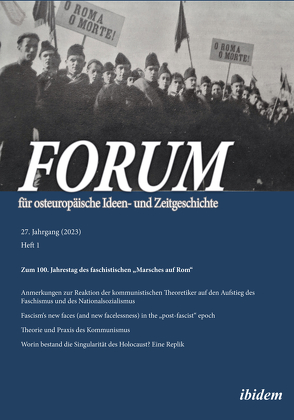
[Over] the last decade there has emerged a growing explicit (theoretically formulated) or tacit (pragmatic) acceptance by Anglophone academics working in the field that fascism’s ineliminable core is made up of the vision of a regenerated political culture and national community brought about in a post-liberal age. Inevitably, such a consensus can never be total and there are academics working in fascist studies who continue to apply a different ideal type of fascism, some of whom express deep scepticism about the very existence of an area of convergence on the centrality to fascism of an ultra-nationalist myth of rebirth. The most cited version of the consensus applied by academics who are sympathetic to it is the highly synthetic formula that I used to encapsulate my own ideal type: ‘Fascism is a political ideology whose mythic core in its various permutations is a palingenetic form of populist ultra-nationalism …
The totalitarian movements represented by the PNF and the NSDAP and the totalitarian regimes that they underpinned became the role model for all revolutionary nationalists in the inter-war period and synonymous with totalitarian, mass-based revolutionary nationalism itself. This became known as ‘fascism’ after the first such movement to achieve power, namely Mussolini’s fascismo. However, it was only in Italy and Germany that the structural crisis of liberal society was profound enough to generate a genuinely charismatic form of populist politics, one which was not confined to the hard core of movement activists, but involved the particular type of consensus generated by a ‘palingenetic political community’, thereby creating the basis for a fascist regime.
(Aus dem Beitrag von Roger Griffin)
Aktualisiert: 2023-06-21
> findR *
Der moderne Kapitalismus ist seit vielen Forschergenerationen ein vielumstrittenes Wirtschaftssystem, über dessen Vor- und Nachteile für die betroffenen Bevölkerungen bisher keine Übereinstimmung erzielt werden konnte. In diesem Buch werden die ökonomischen Ausprägungen kapitalistischer Produktion in der Antike, dem Mittelalter, dem Feudalismus und Merkantilismus sowie dem Industriekapitalismus miteinander verglichen. Verschiedene Vorstellungen, welche eindeutigen Merkmale ein moderner Kapitalismus aufweisen muss, werden kritisch beleuchtet und aktuelle Auffassungen zurückgewiesen, dass der Kapitalismus ersetzt, abgeschafft oder durch ein alternatives System zumindest ergänzt werden müsse. Keine bisher vorhandene Ökonomie hat arbeitenden Menschen so viele Erleichterungen beschert wie der moderne Kapitalismus.
Aktualisiert: 2023-06-22
> findR *
Der moderne Kapitalismus ist seit vielen Forschergenerationen ein vielumstrittenes Wirtschaftssystem, über dessen Vor- und Nachteile für die betroffenen Bevölkerungen bisher keine Übereinstimmung erzielt werden konnte. In diesem Buch werden die ökonomischen Ausprägungen kapitalistischer Produktion in der Antike, dem Mittelalter, dem Feudalismus und Merkantilismus sowie dem Industriekapitalismus miteinander verglichen. Verschiedene Vorstellungen, welche eindeutigen Merkmale ein moderner Kapitalismus aufweisen muss, werden kritisch beleuchtet und aktuelle Auffassungen zurückgewiesen, dass der Kapitalismus ersetzt, abgeschafft oder durch ein alternatives System zumindest ergänzt werden müsse. Keine bisher vorhandene Ökonomie hat arbeitenden Menschen so viele Erleichterungen beschert wie der moderne Kapitalismus.
Aktualisiert: 2023-06-22
> findR *
Der moderne Kapitalismus ist seit vielen Forschergenerationen ein vielumstrittenes Wirtschaftssystem, über dessen Vor- und Nachteile für die betroffenen Bevölkerungen bisher keine Übereinstimmung erzielt werden konnte. In diesem Buch werden die ökonomischen Ausprägungen kapitalistischer Produktion in der Antike, dem Mittelalter, dem Feudalismus und Merkantilismus sowie dem Industriekapitalismus miteinander verglichen. Verschiedene Vorstellungen, welche eindeutigen Merkmale ein moderner Kapitalismus aufweisen muss, werden kritisch beleuchtet und aktuelle Auffassungen zurückgewiesen, dass der Kapitalismus ersetzt, abgeschafft oder durch ein alternatives System zumindest ergänzt werden müsse. Keine bisher vorhandene Ökonomie hat arbeitenden Menschen so viele Erleichterungen beschert wie der moderne Kapitalismus.
Aktualisiert: 2023-06-22
> findR *
Der moderne Kapitalismus ist seit vielen Forschergenerationen ein vielumstrittenes Wirtschaftssystem, über dessen Vor- und Nachteile für die betroffenen Bevölkerungen bisher keine Übereinstimmung erzielt werden konnte. In diesem Buch werden die ökonomischen Ausprägungen kapitalistischer Produktion in der Antike, dem Mittelalter, dem Feudalismus und Merkantilismus sowie dem Industriekapitalismus miteinander verglichen. Verschiedene Vorstellungen, welche eindeutigen Merkmale ein moderner Kapitalismus aufweisen muss, werden kritisch beleuchtet und aktuelle Auffassungen zurückgewiesen, dass der Kapitalismus ersetzt, abgeschafft oder durch ein alternatives System zumindest ergänzt werden müsse. Keine bisher vorhandene Ökonomie hat arbeitenden Menschen so viele Erleichterungen beschert wie der moderne Kapitalismus.
Aktualisiert: 2023-06-22
> findR *
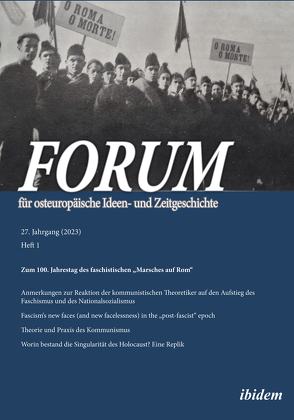
[Over] the last decade there has emerged a growing explicit (theoretically formulated) or tacit (pragmatic) acceptance by Anglophone academics working in the field that fascism’s ineliminable core is made up of the vision of a regenerated political culture and national community brought about in a post-liberal age. Inevitably, such a consensus can never be total and there are academics working in fascist studies who continue to apply a different ideal type of fascism, some of whom express deep scepticism about the very existence of an area of convergence on the centrality to fascism of an ultra-nationalist myth of rebirth. The most cited version of the consensus applied by academics who are sympathetic to it is the highly synthetic formula that I used to encapsulate my own ideal type: ‘Fascism is a political ideology whose mythic core in its various permutations is a palingenetic form of populist ultra-nationalism …
The totalitarian movements represented by the PNF and the NSDAP and the totalitarian regimes that they underpinned became the role model for all revolutionary nationalists in the inter-war period and synonymous with totalitarian, mass-based revolutionary nationalism itself. This became known as ‘fascism’ after the first such movement to achieve power, namely Mussolini’s fascismo. However, it was only in Italy and Germany that the structural crisis of liberal society was profound enough to generate a genuinely charismatic form of populist politics, one which was not confined to the hard core of movement activists, but involved the particular type of consensus generated by a ‘palingenetic political community’, thereby creating the basis for a fascist regime.
(Aus dem Beitrag von Roger Griffin)
Aktualisiert: 2023-06-21
> findR *
Die Wirkungsgeschichte von Wagners Antisemitismus zwischen 1883 und 1945 ist nach wie vor umstritten, auch wenn die Wagner-Literatur kaum noch zu überblicken ist. In diesem Buch wird eine Interpretation angeboten, die zwar Wagners Judenfeindschaft rassistische Tendenzen bescheinigt, aber keine Identität zwischen Wagners und Hitlers Rassismus konstatiert. Der Bayreuther Wagnerclan war entscheidend daran beteiligt, daß der wagnerbegeisterte Hitler und viele Nationalsozialisten in ihrem Judenhaß seit 1923 mit einer umfassenden ideologischen Unterstützung der Wagnerfamilie rechnen konnten.
Aktualisiert: 2023-06-15
> findR *

Vor der Machtergreifung der Nationalsozialisten zählte Julius Wolf zu den bedeutendsten deutschen Ökonomen und Sozialwissenschaftlern. Wie konnte es kommen, daß sein umfangreiches Werk nach seinem Tod 1937 weitgehend in Vergessenheit geriet? Seine jüdische Herkunft, seine Außenseiterrolle, der Verkauf oder die Vernichtung seines Nachlasses durch die Nationalsozialisten spielen dabei eine wichtige Rolle, können das Phänomen aber nicht ganz erklären.
Aufgrund von Archivmaterialien aus Europa, Japan und den USA und der Analyse der vielfältigen Schriften von Wolf rekonstruiert der Autor dessen Stellung in der deutschen Wissenschaftslandschaft und revidiert dabei gängige Ansichten über sein Werk und Wirken. Das vierjährige Trauma seines Lebens im Dritten Reich hat Wolf dazu getrieben, zwei umfangreiche Bücher über die Altägypter und die Genealogie des Hauses Habsburg-Lothringen zu verfassen, die 1935 und posthum 1940 erschienen sind. Viele seiner Theorien und wissenschaftlichen Erkenntnisse sind auch heute noch von großer Aktualität.
Aktualisiert: 2023-06-15
> findR *
MEHR ANZEIGEN
Bücher von Kiesewetter, Hubert
Sie suchen ein Buch oder Publikation vonKiesewetter, Hubert ? Bei Buch findr finden Sie alle Bücher Kiesewetter, Hubert.
Entdecken Sie neue Bücher oder Klassiker für Sie selbst oder zum Verschenken. Buch findr hat zahlreiche Bücher
von Kiesewetter, Hubert im Sortiment. Nehmen Sie sich Zeit zum Stöbern und finden Sie das passende Buch oder die
Publiketion für Ihr Lesevergnügen oder Ihr Interessensgebiet. Stöbern Sie durch unser Angebot und finden Sie aus
unserer großen Auswahl das Buch, das Ihnen zusagt. Bei Buch findr finden Sie Romane, Ratgeber, wissenschaftliche und
populärwissenschaftliche Bücher uvm. Bestellen Sie Ihr Buch zu Ihrem Thema einfach online und lassen Sie es sich
bequem nach Hause schicken. Wir wünschen Ihnen schöne und entspannte Lesemomente mit Ihrem Buch
von Kiesewetter, Hubert .
Kiesewetter, Hubert - Große Auswahl an Publikationen bei Buch findr
Bei uns finden Sie Bücher aller beliebter Autoren, Neuerscheinungen, Bestseller genauso wie alte Schätze. Bücher
von Kiesewetter, Hubert die Ihre Fantasie anregen und Bücher, die Sie weiterbilden und Ihnen wissenschaftliche Fakten
vermitteln. Ganz nach Ihrem Geschmack ist das passende Buch für Sie dabei. Finden Sie eine große Auswahl Bücher
verschiedenster Genres, Verlage, Schlagworte Genre bei Buchfindr:
Unser Repertoire umfasst Bücher von
- Kiesgen, Alexander
- Kiesgen, Birte
- Kiesgen, Christof
- Kiesgen, Laurenz
- Kiesgen, Nick
- Kiesgen, Peter
- Kiesheyer, Bernd
- Kiesig, Sebastian
- Kiesinger, Kurt G
- Kiesinger-Jehle, Barbara
Sie haben viele Möglichkeiten bei Buch findr die passenden Bücher für Ihr Lesevergnügen zu entdecken. Nutzen Sie
unsere Suchfunktionen, um zu stöbern und für Sie interessante Bücher in den unterschiedlichen Genres und Kategorien
zu finden. Neben Büchern von Kiesewetter, Hubert und Büchern aus verschiedenen Kategorien finden Sie schnell und
einfach auch eine Auflistung thematisch passender Publikationen. Probieren Sie es aus, legen Sie jetzt los! Ihrem
Lesevergnügen steht nichts im Wege. Nutzen Sie die Vorteile Ihre Bücher online zu kaufen und bekommen Sie die
bestellten Bücher schnell und bequem zugestellt. Nehmen Sie sich die Zeit, online die Bücher Ihrer Wahl anzulesen,
Buchempfehlungen und Rezensionen zu studieren, Informationen zu Autoren zu lesen. Viel Spaß beim Lesen wünscht Ihnen
das Team von Buchfindr.



















